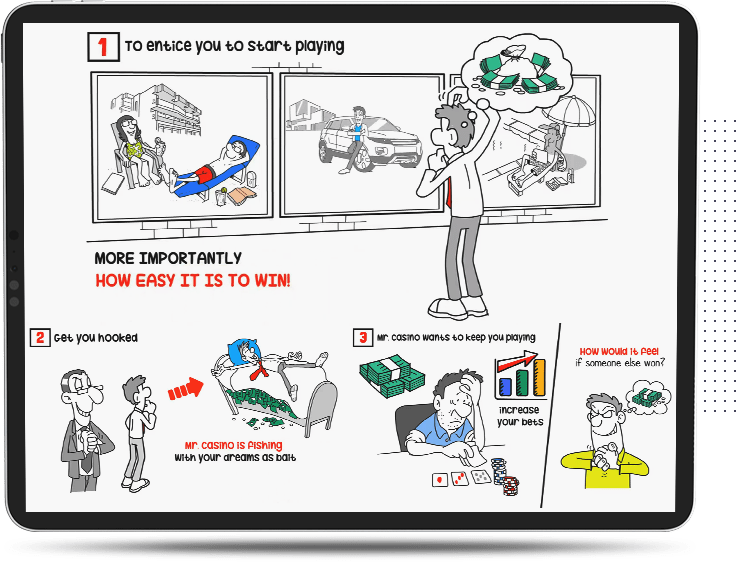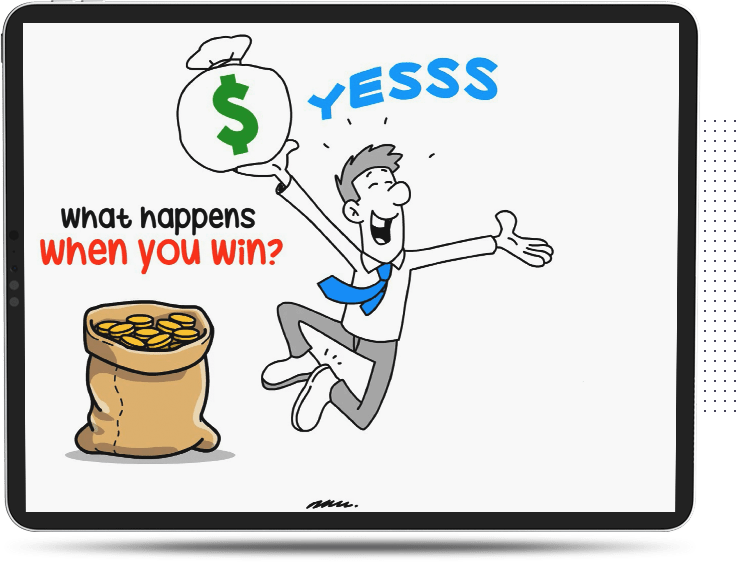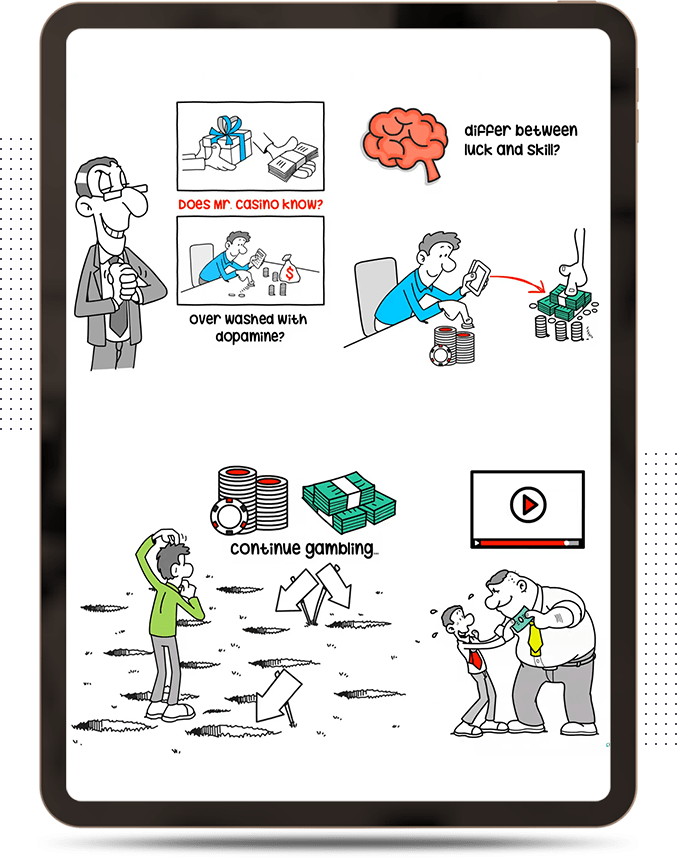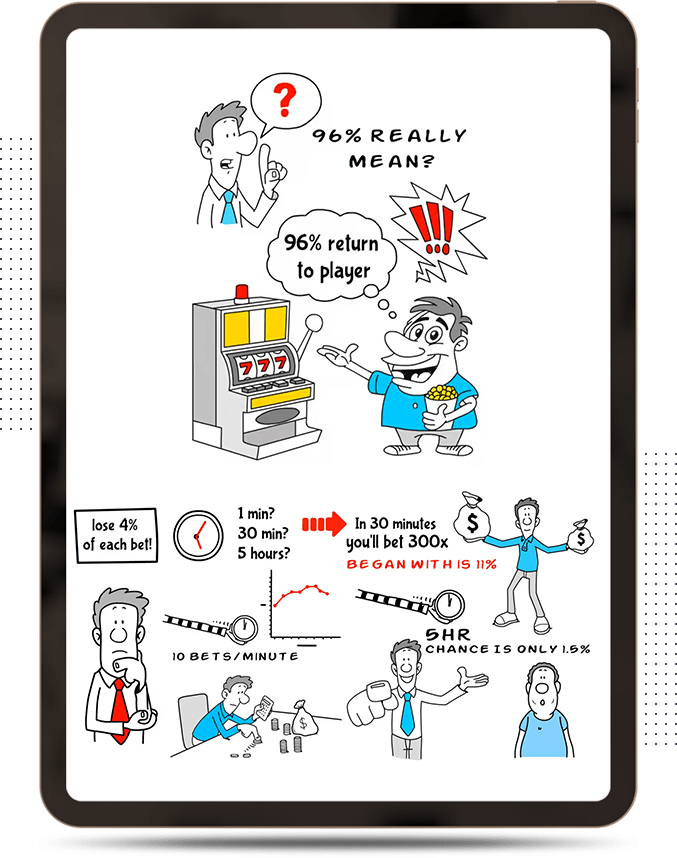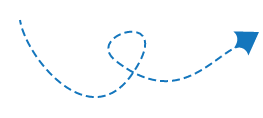Can You Win?
Why is winning the first time you gamble the worst thing that can happen? How are casino games developed to hook you? Why does the gambling industry spend $10B annually to convince you that you can be a winner?
- Very near wins – The masterpiece of manipulation
- What are fake wins?
- Ugly truth – The real chance of winning on a slots?
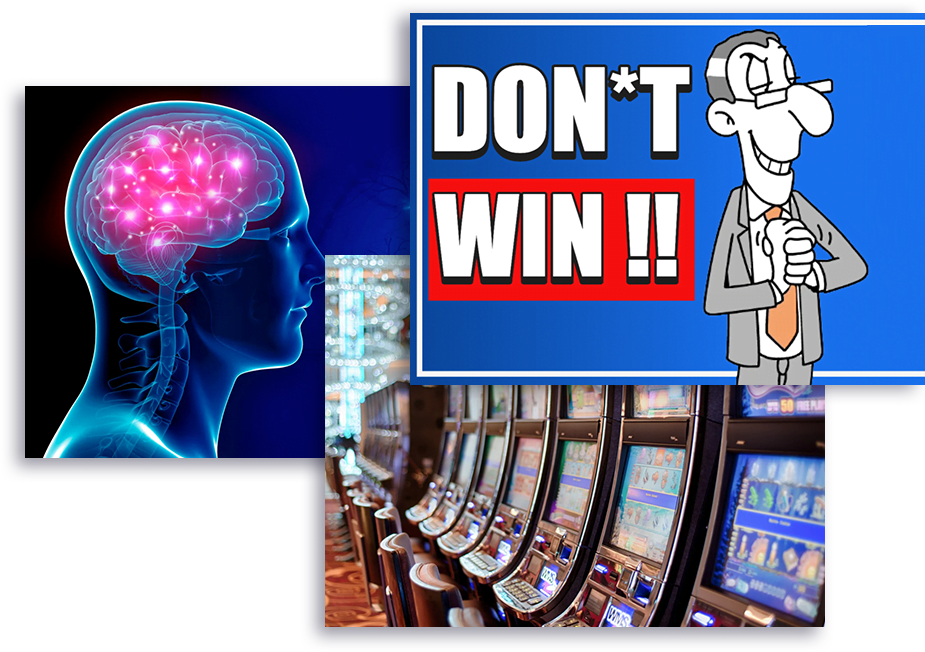
What Does The Casino Want?
In essence, there are 3 things the gambling companies want:
- Tempt us to start playing. A common way is to exploit our monotonous daily lives and our dreams of more. Who isn’t dreaming about long holidays on a warm beach, a cold umbrella drink, and a flashy car? The intention is to create an image in our heads of what is possible, and more importantly, how nearly everyone around us is winning. It’s the primary purpose of all the commercials.
- Get us hooked. Keep painting the picture in our head until it’s so real we start believing in it. Make us think that the only reason we haven’t won yet is unluck.
- Keep us playing slot machines. How many times have you seen people leaving the slot machine in a movie, only to see how the next player getting the progressive jackpots? Coincidence? HARDLY! Someone has paid for that message, and it had made us fair “missing out,” so we keep playing.
The industry wants to create an image of entertainment and big chances to win. They don’t want us to think about why they do what they do. We believe they don’t want us to think at all.
What do you think?
How Can Winning Be Bad?
Isn’t that what gambling is all about? It is, and that is the problem. Because something happens in our head when we win, no skill can help you win at scratch tickets, slots machines, or lotteries. Most games depend solely on luck. BUT!
Our brain doesn’t understand that. Our primitive brain gets a massive surge of dopamine (part of the brain’s reward system) and believes that it was skills that brought about the winning. Before you say anything about lack of intelligence, this process happens on a subconscious level. It means that our intelligence is bypast.
Before we continue, we need to address one more thing. Research shows that it’s not the win itself that creates the dopamine rush. It’s the anticipation, the seconds before the win, that puts us on our feet. (There is probably a good evolutionary explanation for that, but it’s outside the scope of this guide.)
Do you think the casino and game developers know this? Do you think they will exploit this?
The question isn’t if, but rather how they use the information to hook players to the games.
We don’t want to create hatred toward the gambling industry, and there might be casino game developers that think differently. Therefore, we’ll describe to you how we’d make a game that is intended to get a gambler hooked based on the knowledge we have. Then, it’s up to you to decide if you believe any other games are using these deceiving tricks and manipulations.
Dopamine makes us feel good about ourselves, and it’s an effective painkiller. On QuitGamble.com, we believe that pain is the cause of addiction. It’s the escape from pain people get addicted to. In other words, the more dopamine a game creates, the more it would help people escape their pain (which by most would be considered addictive.)
Here are some features that’ll flood the brain with dopamine: (Perhaps you’ve seen them before?)
- Very near wins (or is it?)
- Visual illusions
- Sounds effects
- Fake wins
What Are Near Wins?
Near wins is a masterpiece of manipulation. Why? Because most of us don’t realize that we’ve been played. So, what is a near win?
“Near wins” is what it sounds like. It’s situations where you think you were close to winning. On a scratch ticket, it could mean that you had 2 symbols and needed 3 symbols of the same to win. We got 2 symbols and needed 3 to win 100K. It was so close, right?
Not really, because the playfield is not randomized. As a game creator, I’d add a few “2s” to add to the excitement.
3 objectives of a near win.
- To make the player think he/she was close to winning.
- To trigger dopamine rushes into the brain of the player.
- We almost forgot the main goal – To make the player want to try again because he was so close… Can you recall being “close” to winning big?
Near wins are used in all sorts of games. Some slot machines use it too, but virtual games have taken near wins to another level by adding sound effects. Could you imagine how? Perhaps by adding the same sound effect to a near win as to a real win. We think that would do the trick! After all, our brain can’t distinguish between close wins and losses. The sound effect makes the dopamine rush stronger.
The more dopamine, the more “addictive” the game becomes. Let’s add a bonus wheel to the slot machine. If you manage to get the bonus wheel, it looks like a 1:20 chance for the progressive jackpot. Pretty good, right? BUT, yes, there is a but here too. The machine is rigged, so what you see is a visual illusion. Suppose the jackpot wheel was completely random, like a coin tossing. Then you’d win one time in twenty. But this is not the case in my game. Have you seen any games like that?
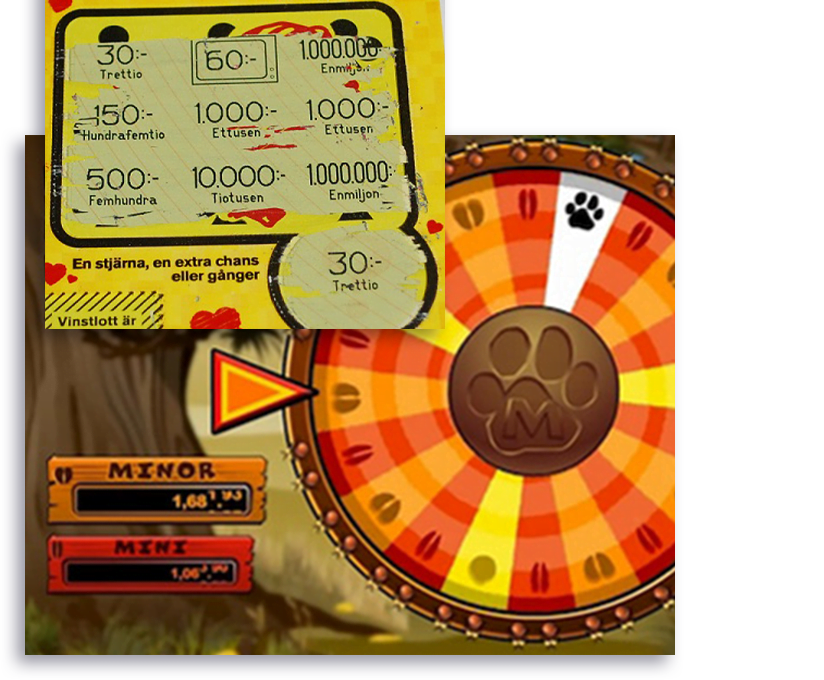
How To Create False Wins
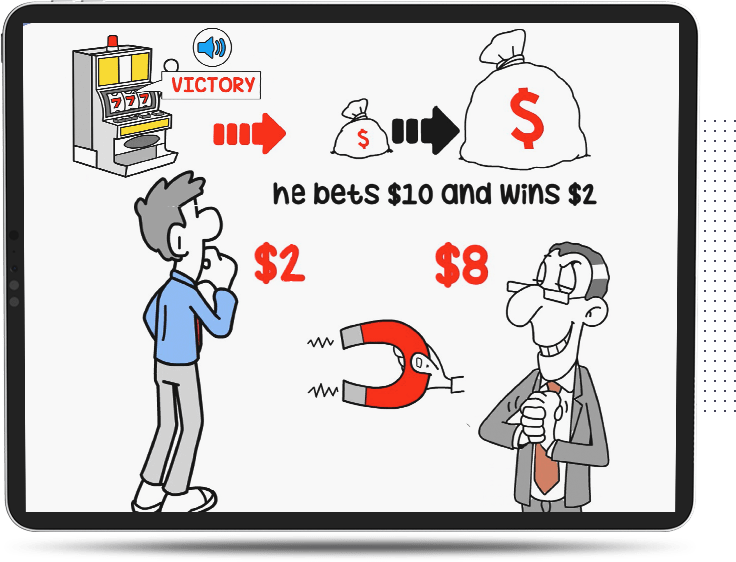
It sucks that the customers get bored if they never win. To deal with that problem, he creates false wins. What is a false win? It’s something that looks like (and of course the sound and visual effects make it feel like) a win, but it’s not a win! For example, you bet $10 and win $5. Everything on the screen screams WIN to disguise that you lost $5.
Would you exchange a $10 bill for a $5 bill and feel like a winner?
False wins are wildly used because they are perceived as winnings. Most customers would stop playing if they didn’t feel like they won. The false wins keep them playing!
Gambling marketing aims to get you to believe that you can win. But it’s not enough. The commercial wants you to think that it’s easy to win. There are several ways they do that. If gambling commercial is legal in your area, then you might have heard “success stories” of people who just spent a dime and won ridiculous amounts. These stories have one purpose, to make you believe.
Another way is to publish “guides” on “how to beat the system”. The intention is to make you believe that there are skills involved in games like blackjack, video poker, lotteries, and slots. That perhaps there is a way to win after all. These guides are often published in well-known newspapers that silently act as casino affiliates. Have you come across any “guides” like these?
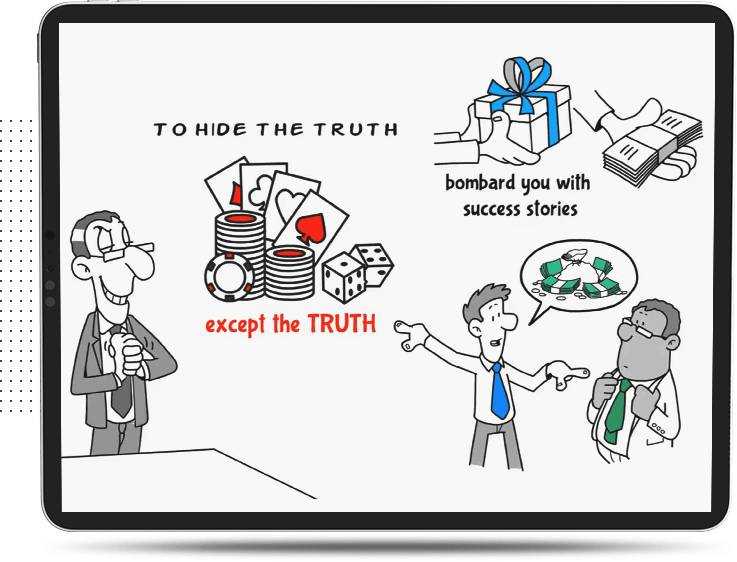
What Is The Real Chance To Win?
Expose The Truth!
Return to player, RTP is what you get back on every dollar you bet. If you bet $10 and, on average, win $5/bet over 100 bets, the return to the player is 50%. Online slots have around 95% RTP (it varies). 95% sounds high, but it means that the player will lose 5% on average every time they bet. If it’s one time, it’s not that bad. But on a slot machine, a player can easily play 10 rounds in 1 minute; that’s 300x in 30 minutes!
When we know the RTP and the number of bets, we can use advanced mathematics to calculate the chance of having more money after a specific period than what we started with. IMPORTANT, more money doesn’t mean a lot more money, only that you haven’t lost more than you won.
After 30 minutes, the chance to have more money than at the start is 11%. After 5 hours, THE CHANCE IS ONLY 1.5%![i]
How many hours did you play slot machines last year?
How About Blackjack?
Some believe blackjack is a game of skill. To some extent, the player can affect the outcome. But, even if played perfectly, the player has a statistical disadvantage to the house, about 47:53. It means that if you play perfectly, you have a 47% chance to win in each round. If we add up all rounds during an hour, the chance is down to 23%. If you would play 1h/week for a year, the chance to become a winner is 1.9%… Discouraging?
Winning On Scratch Tickets?
Scratch tickets are very popular. A Swedish ticket called Triss is marketed as “Suddenly it happens.” It has a return to players just shy of 50%. How long time is “Suddenly”? If you’d buy 2 tickets weekly on an annual basis, it will take on average 200 years before you win more than you lose one year. Suddenly, suddenly feels like an eternity.
To put it into perspective. If Napoleon Bonaparte had still been alive and played Triss twice a week, he would still not have been a winner. If we were him, we would probably also have fancied our chances to invade Russia.
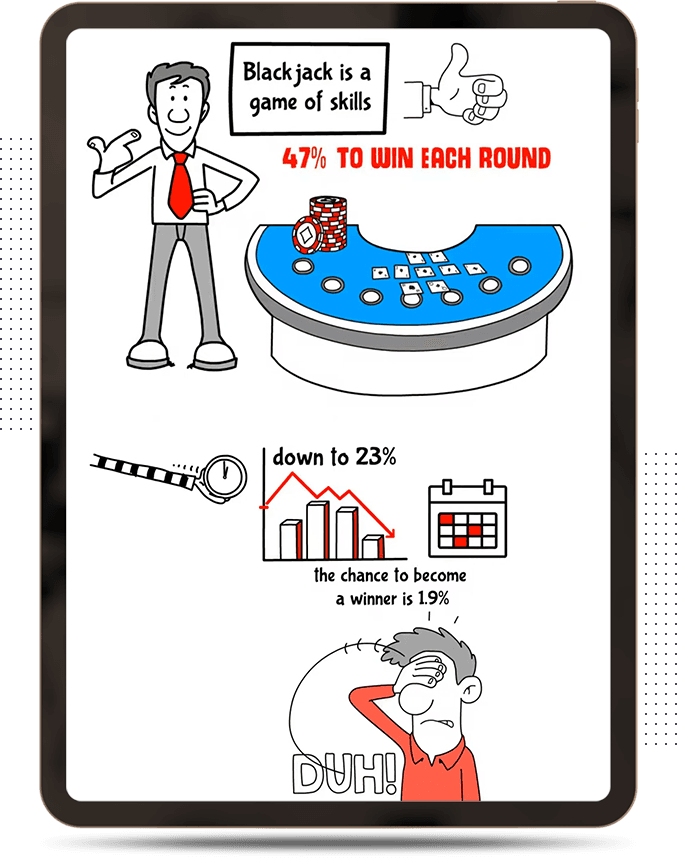
Can You Win? What Do You Think?
The gambling industry spends $10B/year to convince you that you can. There is no secret to winning slots, you can’t beating the slots, only loose.
Why do you think they do that?
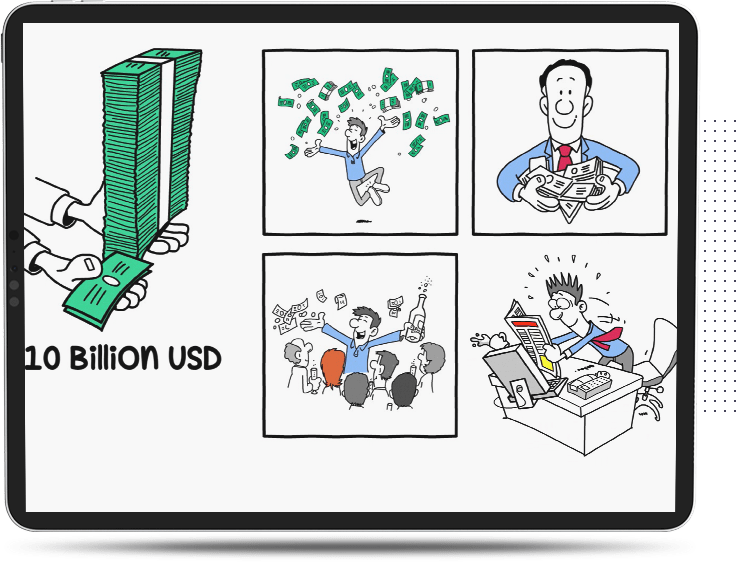
People are not unlucky. The games are designed so people will continue to play, even if they lose small chunks of money all the time. If against all odds, a player hits a big win, 1000s of compulsive gamblers can attest that winning was the worst thing that could ever have happened.
If you found this article helpful, please share it with somebody you think would benefit from it too!
 English
English Español
Español Français
Français Português
Português Svenska
Svenska